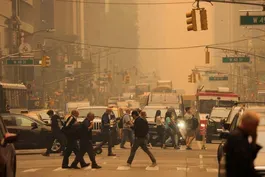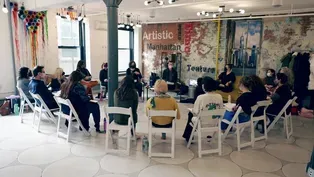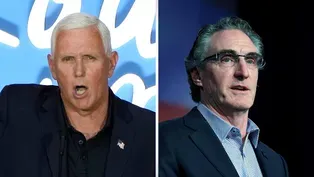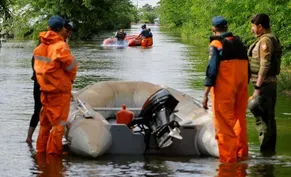
Study: First words from police affect traffic stop outcome
Clip: 6/7/2023 | 5m 31sVideo has Closed Captions
Study shows first words from police during traffic stops affect outcome for Black drivers
Since the high-profile police killings of Philando Castile, Daunte Wright and Tyre Nichols, all of which began as traffic stops, calls for de-escalation by officers have been growing. A study analyzing footage in 577 stops of Black drivers found the first 45 words spoken by the officer could determine how that encounter ended. Amna Nawaz spoke with Tracey Meares to learn more.
Problems with Closed Captions? Closed Captioning Feedback
Problems with Closed Captions? Closed Captioning Feedback
Major corporate funding for the PBS News Hour is provided by BDO, BNSF, Consumer Cellular, American Cruise Lines, and Raymond James. Funding for the PBS NewsHour Weekend is provided by...

Study: First words from police affect traffic stop outcome
Clip: 6/7/2023 | 5m 31sVideo has Closed Captions
Since the high-profile police killings of Philando Castile, Daunte Wright and Tyre Nichols, all of which began as traffic stops, calls for de-escalation by officers have been growing. A study analyzing footage in 577 stops of Black drivers found the first 45 words spoken by the officer could determine how that encounter ended. Amna Nawaz spoke with Tracey Meares to learn more.
Problems with Closed Captions? Closed Captioning Feedback
How to Watch PBS News Hour
PBS News Hour is available to stream on pbs.org and the free PBS App, available on iPhone, Apple TV, Android TV, Android smartphones, Amazon Fire TV, Amazon Fire Tablet, Roku, Samsung Smart TV, and Vizio.
Providing Support for PBS.org
Learn Moreabout PBS online sponsorshipAMNA NAWAZ: A new study reveals just how crucial the first 30 seconds of a police encounter can be, in particular for black drivers.
Since the high-profile police killings of Philando Castile, Daunte Wright, and Tyre Nichols, all of which began as traffic stops, calls for de-escalation by officers have been growing.
The study in the Proceedings of the National Academy of Sciences analyzed body camera footage in 577 traffic stops of black drivers in one midsize American city over a month.
It found that the first 45 words spoken by the police officer could determine how that encounter ended.
To help us understand what this can mean for the future of policing, I'm joined by Tracey Meares, professor of law and founding director of the Justice Collaboratory at Yale Law School.
She was also among those who reviewed this particular study.
Tracey Meares, welcome back.
Thanks for joining us.
TRACEY MEARES, Justice Collaboratory Founding Director, Yale Law School: Happy to be here, Amna.
Good to see you.
AMNA NAWAZ: So, the study found that if the police officer began the encounter by issuing a command or not giving a reason for the stop, it was three times more likely that the interaction would escalate, that the driver could be searched or handcuffed or arrested, versus if the police officer began with a greeting.
Did that finding surprise you?
TRACEY MEARES: It didn't surprise me.
It's very consistent with much of the work that I have done over the past decade or so.
What I do think is incredibly notable about this particular research study was the precision with which they were able to measure the time to predict an escalation and the specific words.
AMNA NAWAZ: And just to be specific here, what are we talking about in that early interaction?
It's the difference between an officer saying, hello, sir, how are you, versus, let me see your license and registration?
What are we talking about?
TRACEY MEARES: What we're talking about is the extent to which, when an officer stops a person for a traffic violation, typically, very low-level violations, whether that officer actually takes an opportunity to tell the driver why the driver was actually stopped.
And what the research shows is, in the situations in which that doesn't happen -- or let me back up.
In situations in which there is an escalation, it is 2.5 times more likely that the officer didn't explain the reason for the stop.
That's what the research found.
AMNA NAWAZ: So, nearly 98 percent of the drivers who experienced one of those escalated outcomes was black.
What does that tell you about implicit bias and racism that persists in our policing today?
TRACEY MEARES: I think one of the things that's incredibly interesting about this study -- and it's worth folks taking a chance to read it - - is, the reason why the researchers focused on black drivers, 577 of them, as you noted, was that, in one out of six of those stops, those stops ended in an escalation, an arrest, a search, handcuffing or the like.
They also did assess white drivers, 267 incidents during that same time period where white drivers were stopped, but only four of those resulted in an escalation.
So, we have got to kinds of disparities here.
First, many, many more drivers, black drivers, were stopped in the first instance for traffic violations.
And, second, a much higher percentage of black drivers experienced escalations than did white drivers.
So they focused on the black driver.
AMNA NAWAZ: So, Tracey, how do we solve for this from policing or a training standpoint?
Because we have heard a lot about implicit bias training.
These officers were all wearing body cameras.
TRACEY MEARES: Right.
AMNA NAWAZ: Presumably, they didn't think they were doing anything wrong.
TRACEY MEARES: Yes, it's fascinating.
I mean, the work that I have done on procedural justice suggests that it's very important to explain to people why you are stopped, because it makes people believe that they are -- or come to conclusions that their interaction is much more fair than when that situation doesn't happen.
So, one thing you can do is actually train officers to engage in that explanation.
However, many of those officers were very likely trained to do so.
So, it does bring a question, why, in the situations in which there was escalation, did they either decide or subconsciously fail to explain what they're doing?
I think that cause -- calls for much deeper research into the exactly the kind of bias that you're talking about.
AMNA NAWAZ: Tracey, as you know, a lot of the burden right now seems to rest with those black drivers: How do I keep myself safe?
How do I comply?
How do we shift the burden to the person who has power in that situation, to the police officer?
TRACEY MEARES: I think one of the ways we shift the burden to the police officer is by limiting the opportunities for the police officer to engage in this -- in this regulation to begin with.
Historically, police officers were the ones who were essentially traffic lights.
They stood in the middle of the streets and they directed traffic.
We now automate that.
And I think we have seen today that, with cameras and other things, we can do that kind of more automated regulation of traffic violations as well.
AMNA NAWAZ: That is Tracey Meares, professor of law and founding director of the Justice Collaboratory at Yale Law School, joining us tonight.
Tracey, thank you.
TRACEY MEARES: Thanks, Amna.
Canadian wildfires blanket eastern U.S. with smoke
Video has Closed Captions
Canadian wildfires blanket eastern U.S. with smoke, causing poor air quality for millions (4m 5s)
How intimacy coordinators ensure safety on set
Video has Closed Captions
How intimacy coordinators ensure safety on theater and film sets (8m 16s)
Pence and North Dakota governor join GOP presidential race
Video has Closed Captions
GOP presidential field grows to 9 with Mike Pence and North Dakota governor joining race (11m 50s)
Scope of dam disaster in Ukraine comes into full view
Video has Closed Captions
Evacuations continue in Ukraine as scope of dam disaster comes into full view (8m 33s)
Providing Support for PBS.org
Learn Moreabout PBS online sponsorshipSupport for PBS provided by:
Major corporate funding for the PBS News Hour is provided by BDO, BNSF, Consumer Cellular, American Cruise Lines, and Raymond James. Funding for the PBS NewsHour Weekend is provided by...















